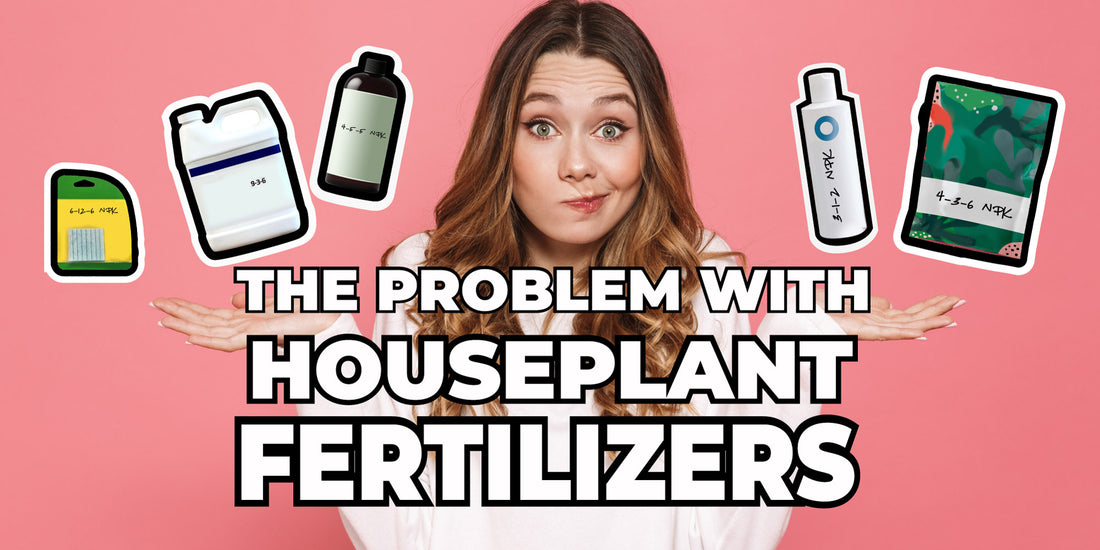
When it comes to houseplant fertilizer, it can be tough to know what to look for. There are so many products out there, from synthetic fertilizer to organic fertilizer, liquid fertilizer and dry powders. Each promises to help your plants grow bigger, faster, and stronger. But not all fertilizers are created equal, and some can actually do some harm rather than good.
Top 4 Problems with Common Houseplant Fertilizer
Houseplant fertilizer and plant nutrition can be a complicated business to understand. If you're a plant lover, you're probably overwhelmed with the options for your leafy babies. But don't worry, we're hear to help...

Here are the top four problems with typical fertilizers - and how Bless Your Soil® addresses them all:
PROBLEM #1 : Incomplete nutrition
Only NPK ("macronutrients").
Want to grow some weakling plants? Pick up a package or bottle of the ever-present NPK fertilizer. It has just three ingredients. This simple, essential formula of NPK nutrient levels (Nitrogen, Phosphorus, and Potassium) macronutrients that plants need in large quantities. Tablet fertilizers, plant food spikes, and liquid plant foods are notorious for this simple combo and may even call themselves a balanced fertilizer. Be warned, any fertilizer with only an NPK analysis is not complete.
Urea-based nitrogen.
While urea-sourced nitrogen serves well in some areas of gardening, it's not recommended for houseplants. Make sure your fertilizer doesn't contain urea as the primary source of nitrogen – in fact, zero urea is best for houseplants. Urea-based fertilizers can lead to excessive growth, weak plants, and increased vulnerability to pests and diseases. They have the potential to burn plant roots if not properly diluted or applied. Instead, opt for other sources of nitrogen when applying to houseplants.
Lack of trace minerals ("micronutrients").
Fact is, plants need other essential micronutrients, too, such as magnesium, iron, boron, copper, etc. Without these vital elements, plants can become stressed, stunted, and more susceptible to pests and diseases. Make sure your houseplant fertilizer is beefed up with plenty of these little goodies for your leafy babies.
Plants need more than a simple NPK to stay healthy. They need a complete spectrum of minerals and vitamins, too.
Related: Demystifying the NPK ratio
Lack of soil health materials.
Just like humans, plants need more than just basic nutrients. They require organic elements to nourish the soil microbiome (microbes). Yes, those microbes need to eat, too. On the other hand, some fertilizers are only organic materials which can be a problem for indoors by attracting pests and delivering unexpected results.
SOLUTION #1 : Complete nutrition.
Bless Your Soil® hybrid fertilizers include the full spectrum of minerals, organic amino acids, and naturally-occurring plant hormones and vitamins that growing plants need for good health. These specialized formulas provide a comprehensive range of nutrients and compounds for growing plants and their hungry soil microbes.

All the nutrients your growing plants need to
thrive come in each pouch of Bless Your Soil®
fertilizers. Shop fertilizers >
PROBLEM #2 : Unstable trace minerals.
Did you know that the ingredients in fertilizer can react when in contact with water and even the air? These reactions can become toxic to your plant over time.
Unstable minerals are common problem with fertilizers and can lead to nutrient deficiencies, stunted growth, and even a toxic soil environment with long term use.
So, why do fertilizer manufacturers use unstable minerals? Simply put, they're cheaper. The negative effects take time to show, and by then, you might be blaming something else for your plants' problems—like your own gardening skills.
SOLUTION #2 : Organically-bonded trace minerals.
Bless Your Soil®'s fertilizers contain trace minerals that are produced with a unique organic-bonding process (chelation) that keeps them stable and available to your plants, even in challenging soil conditions or variations in water hardness. This is why Bless Your Soil® is a great choice for long term plant care.
Source: Instagram @thatplantguy_ty
PROBLEM #3 : Poor value.
Making apples-to-apples comparisons with fertilizers can be tough, and manufacturers often take advantage of this. Most people aren't plant or chemistry experts, so they might not realize when they're getting poor value. Take liquid fertilizers, for instance. They're super convenient, but did you know they're often mostly water? This means you're paying for a lot of extra weight to be shipped around. Plus, they can still lack important minerals and nutrients. Tablet fertilizers aren't much better. They might seem handy, but they usually come in tiny packages with only a few tablets and suffer from the same nutrient deficiencies. It can feel like a bit of a rip-off, don't you think?
SOLUTION #3 : Dry powder concentrated fertilizer.
Bless Your Soil® offers a solution with its concentrated dry formulas, providing excellent value with multiple uses, ease of transport, and storage without risk of contamination or spoilage. Each pouch can treat dozens of gallons of water, fitting perfectly into your fertilizing schedule. Additionally, these formulas are versatile, suitable for both foliar feeding and soil application, ensuring your plants get the nutrients they need in the most effective way possible.
Problem #4 : Low effectiveness or unpredictable results.
Some fertilizers, including slow-release and plant food spikes, often suffer from low effectiveness and unpredictable results. They may release nutrients too slowly or inconsistently to benefit your plants optimally. This can lead to erratic growth patterns or even harm the root systems. Additionally, these fertilizers are often made with materials that pose risks to the environment, pets, and children in the home. It's a risky choice!
Organic fertilizers, while beneficial, can also be unpredictable and often have a strong odor, which is not ideal for indoor use. Decomposing organic matter in the house can create unpleasant smells and attract pests, making it less than ideal for a home environment. It's better to keep those for outdoor gardening.
SOLUTION #4 : Instant feed, water soluble fertilizer.
Bless Your Soil® houseplant fertilizer provides instant nutrition direct to the soil, roots, and leaves, so your plants get the nutrients they need right away with predictability—guaranteed. These gentle fertilizers won't burn or damage delicate plant roots, or be tempting to playful pets or children.

Bless Your Soil® plant food fertilizers combines the best of science and nature and come with a "new leaf" guarantee.
So, what are the best fertilizers for houseplants?
If you're looking for a fertilizer that truly delivers, look no further than Bless Your Soil®. Our complete and balanced hybrid formulas bring the best of science and nature to your houseplants and gardens. We've consciously formulated our products to provide all the nutrients (amino acids, vitamins, and minerals) your plants need to grow strong and healthy, without any of the downsides of typical fertilizers.

Houseplant Fertilizer Checklist
| Feature | Description | |
|---|---|---|
| Full spectrum of minerals | Look for a fertilizer that provides a comprehensive range of essential minerals, including urea-free nitrogen, phosphorus, potassium, magnesium, and other trace elements. | ✅ |
| Supplemental vitamins or phyto-vitamins | Consider fertilizers that offer additional water-soluble vitamins or naturally occurring vitamins derived from organic sources like sea kelp and yucca extract, enhancing plant growth and vitality. | ✅ |
| Stabilized organically bonded trace minerals | Choose fertilizers that contain stabilized trace minerals, such as those chelated with "EDTA," which are safer for your plants and home environment. | ✅ |
| Dry formula with seal | Opt for a fertilizer in a dry form, typically packaged with a seal, ensuring long-term stability, preventing spoilage, and allowing for easy storage and transportation. | ✅ |
| Good value | Compare the percentages of nutrients and evaluate the number of uses per package to determine the cost-effectiveness and value of the fertilizer. | ✅ |
Bless Your Soil® houseplant fertilizer checks all the boxes for growing healthy plants. It provides complete nutrition with a full spectrum of minerals, organic amino acids, and vitamins, ensuring your plants get everything they need. The stabilized, organically bonded trace minerals prevent nutrient deficiencies and toxic buildup, offering a safer choice for your home. The dry, concentrated formula offer excellent value, ease of transport, and storage without risk of contamination or spoilage. Plus, it's ideal for foliar feeding, allowing you to spray the nutrients directly onto the leaves for quicker and more efficient absorption.
So why wait? Give your plants the nutrition they deserve with Bless Your Soil®.





